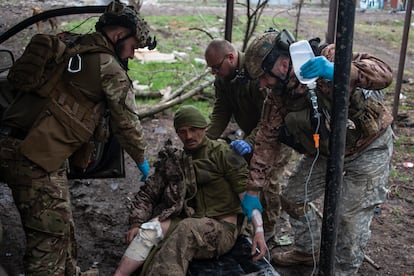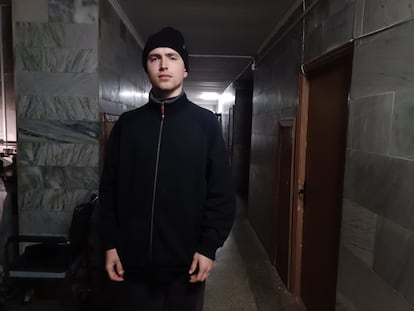Scant resources available to Ukraine’s soldiers as they confront psychological effects of war
Ukrainian authorities are starting to face up to the scale of the problem the country has, as hundreds of thousands of soldiers head into combat without the mental-health support they need


The war in Ukraine is not only unfolding on the frontline; explosions and deaths are also playing out again and again in the mind’s eye of the soldiers fighting on it. The largest-scale conflict that Europe has witnessed since the Second World War will leave hundreds of thousands of troops on both sides psychologically scarred for life, say experts and military personnel interviewed by EL PAÍS. When it comes to the consequences of war for soldiers’ mental health, Ukrainian authorities are starting to confront the magnitude of the problem they face.
Currently, around one million Ukrainian men and women are involved in the country’s defense. Ukraine’s armed forces have not released firm figures, but military sources have estimated to this newspaper that around 500,000 soldiers have had experience of combat on the frontline. Thousands of them are now suffering from mental disorders arising from what they have witnessed. “What we’re up against is of unimaginable proportions, and the country isn’t prepared for it,” concludes Robert van Voren, one of the top experts on psychiatry in the former member states of the Soviet Union.
Van Voren is the chief executive of the Federation Global Initiative on Psychiatry (FGIP), an organization linked to the defense of human rights in Russia and Eastern Europe. The organization, he explains, has been commissioned by the Ukrainian Ministry of Justice to develop a program that offers treatment to war veterans who end up in the country’s prison system. The FGIP’s specialists will train teams tasked with providing support to these inmates, drawing on methods applied in the United Kingdom. “17% of British veterans of Afghanistan and Iraq have gone to prison,” Van Voren notes. This statistic, the Dutch Sovietologist says, highlights the scale of the problem.
In Ukraine, there is only one facility specialized in the psychological treatment of soldiers who have seen combat. It was opened in June 2022, and is run by the country’s armed forces. However, its founder, Colonel Oleksandr Vasilkovskiy, views the Kharkiv Rehabilitation Center more as a private initiative than a state service, as it does not receive public funding; it depends on donations. The facility is housed in a former Soviet sanatorium on the outskirts of Ukraine’s second-largest city, which is in the east of the country, 30 kilometers from the Russian border. In its nine months of existence so far, it has treated more than 2,700 soldiers. It follows a program that lasts for a week and is designed to prepare its patients to return to combat.
Serhiy Fedorechk will not be returning to the frontline for the moment, as he has been left deafened by an explosion. On Friday, he said an emotional goodbye to Vasilkovskiy at the end of his period of rehabilitation at the center. He was picked up by his new partner, a female nurse who treated him in hospital. Fedorechk is a sergeant in the special-forces branch of Ukraine’s air force. He has difficulty speaking. He is reminiscent of a boxer who has just got back to his feet after being knocked out. But he has a smile on his face. At the Kharkiv facility, he spent his first week of peace in over a year.
Vasilkovskiy’s aim is for soldiers to regain enough psychological stability to have the confidence to return to combat. He, Van Voren and other military personnel interviewed in recent months agree that frontline forces are not being rotated as frequently as they should be, leaving soldiers exposed to constant pressure for many months on end. “In an ideal world,” Vasilkovskiy says, “rotations should take place every two or three months. But that’s not the case, because our enemy has far more resources than we do.”
The process of admission to the Kharkiv Rehabilitation Center begins on the frontline itself. There, military psychologists are tasked with identifying soldiers who are suffering panic attacks, demoralization or suicidal thoughts. Once in Kharkiv, they undergo treatment involving a range of individual and collective therapies: these include physiotherapy activities to relax their bodies; exercises in a 32ºC swimming pool that simulates pre-birth; and relaxation rooms with aromas, salts and laser technology.
Maxim Baida, a military psychiatrist since 2011, who oversees the psychological treatment given to the patients at the facility, highlights that it cannot cater for long-term cases of post-traumatic stress disorder, the most common mental illness suffered by soldiers in any war. Its priority is to help soldiers sleep without nightmares, overcome their sense of guilt over dead colleagues and, above all, shake off their feelings of fear when they return to the frontline, when they walk down the street or when confronting a future that they see as extremely uncertain.

Yuliya Sobolta is a therapist for the DoLadu project, which assists injured soldiers in military hospitals in Kyiv. Since 2017, Sobolta has been working with soldiers for month-long periods. DoLadu doesn’t dig deep into the traumas that patients are suffering from; it focuses on stabilizing them, on providing them with relaxation techniques for their return to combat, and on meditation — a practice that is only just being accepted in the military. “It’s still something unusual, because Ukraine is a conservative society guided by orthodox Christianity, and meditation is seen as an outside religious influence.”
Sobolta says the main trauma suffered by soldiers is their guilt at friends who have lost their lives; at the fact that they remain alive in a civilian environment and aren’t alongside their colleagues. She adds that her team has detected a problem that was less evident among soldiers who fought in the Donbas War, which began in 2014 following a Russian-backed separatist uprising in the region. “Now, we see greater feelings of despair,” Sobolta explains. “They feel like nowhere is safe. Their sense of uncertainty about their survival is much more pronounced.”
Anguish over lost colleagues
Vyacheslav Melnykov, 27, is a sniper in an infantry battalion. Before the war, he was a builder. A projectile from an enemy tank landed at his position and, although he escaped with bruising, he has been left with mental scars. He was admitted to the Kharkiv Rehabilitation Center because he would have nightmares every night and his limbs would shake. He is tortured by feelings that he did not do enough to save colleagues who died. He does not want to think about the future, because it causes him anxiety, and he explains that he has been taught techniques for keeping his mind focused. His goal is to return to combat as soon as possible.
“It’s vital that I don’t let all the hatred I feel seep into my family life,” he says. “I want to feel this hatred on the frontline, not at home.” He has lost count of the number of enemy soldiers that he has killed. But he says, with a look that conveys violence, that he is not troubled at all by ending the lives of other human beings: “These people are invading my country. I didn’t go to Russia to kill civilians. I’m protecting our families.”
Sobolta highlights the insufficient number of experts that Ukraine has: by her estimation, there is one psychologist for every 100 soldiers in the country’s military hospitals. At DoLadu, it’s viewed as essential that new batches of military mental-health experts are urgently trained. The project, supported by the United States government, points to work carried out in Israel as a way forward. The foundation headed up by Olena Zelenska, the wife of Ukrainian President Volodymyr Zelensky, runs a program in collaboration with the Israeli government that has trained around 30 therapists at Tel Aviv’s Natal Center in treating victims in areas of conflict.
While designing the project at the Kharkiv Rehabilitation Center, Vasilkovskiy says he studied the treatment programs for veterans of the U.S.’s war in Vietnam. And he is convinced that, since 2014, Ukraine has accumulated enough experience to train its experts — more than any army in NATO. Both he and Sobolta underline the importance of Ukraine’s Donbas War veterans, who have shown themselves to be psychologically more resistant. “These men convey confidence to the unit and know how to act when a colleague, for example, suffers a mental block,” Vasilkovskiy says.
The positive thing to note, says Van Voren, is that the Ukrainian authorities are aware of the problem they have, because they have been dealing with it since 2014 and have been gradually moving closer to the European Union’s standards over the past 30 years. From a negative point of view, he says, “mental health has never been a priority.” Van Voren estimates that a third of Ukraine’s psychiatric facilities have closed because of the war, with many of their workers seeking refuge abroad. Russia has a bigger problem than Ukraine, he adds, because its isolation is to the detriment of its psychiatric sector, and because its soldiers are in a worse position than their Ukrainian counterparts: “They’re fighting in another country, in an environment where they’re hated, and they’re coming from a society in which they have no moral support at all.”
Sign up for our weekly newsletter to get more English-language news coverage from EL PAÍS USA Edition
Tu suscripción se está usando en otro dispositivo
¿Quieres añadir otro usuario a tu suscripción?
Si continúas leyendo en este dispositivo, no se podrá leer en el otro.
FlechaTu suscripción se está usando en otro dispositivo y solo puedes acceder a EL PAÍS desde un dispositivo a la vez.
Si quieres compartir tu cuenta, cambia tu suscripción a la modalidad Premium, así podrás añadir otro usuario. Cada uno accederá con su propia cuenta de email, lo que os permitirá personalizar vuestra experiencia en EL PAÍS.
¿Tienes una suscripción de empresa? Accede aquí para contratar más cuentas.
En el caso de no saber quién está usando tu cuenta, te recomendamos cambiar tu contraseña aquí.
Si decides continuar compartiendo tu cuenta, este mensaje se mostrará en tu dispositivo y en el de la otra persona que está usando tu cuenta de forma indefinida, afectando a tu experiencia de lectura. Puedes consultar aquí los términos y condiciones de la suscripción digital.








































